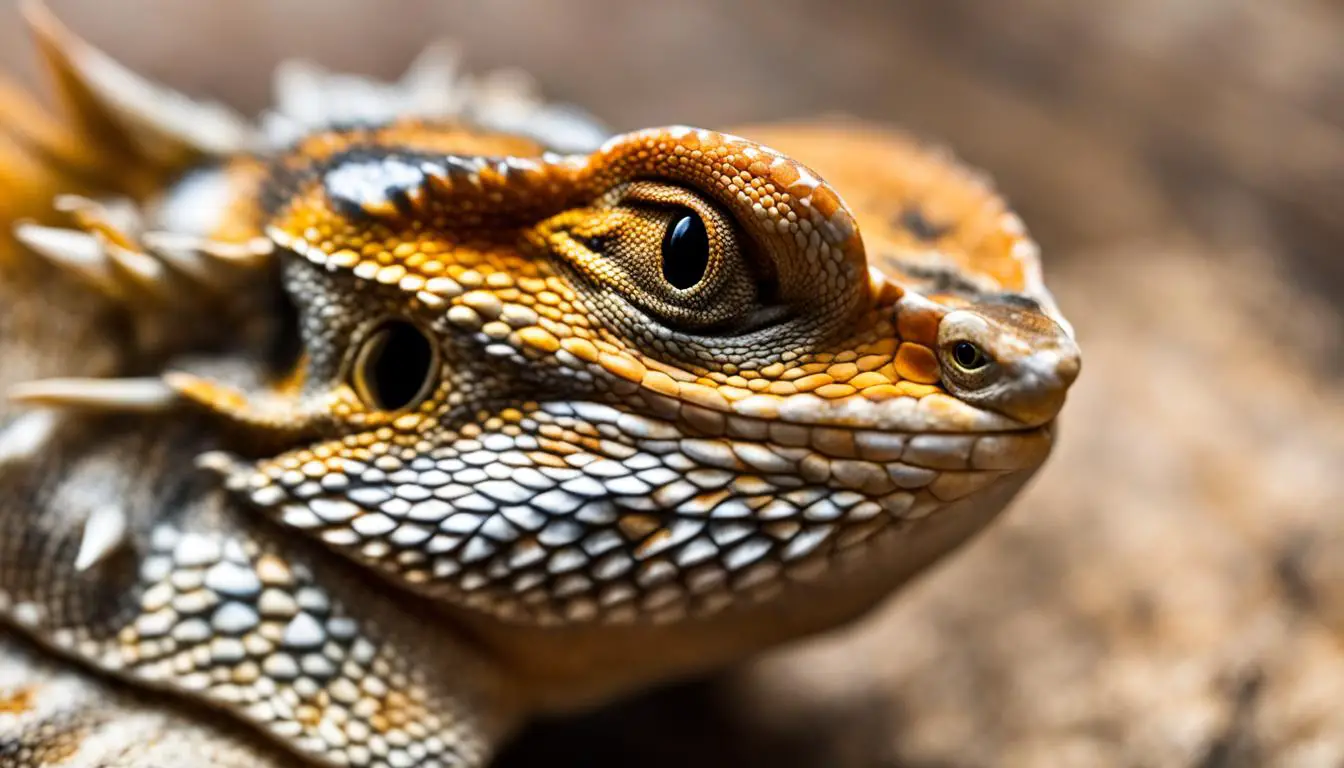Taking care of your bearded dragon’s health is vital for their overall well-being. One important aspect to consider is their belly health. A healthy bearded dragon belly is a sign of good nutrition, proper care, and a stress-free environment. In this article, we will explore the signs of a healthy bearded dragon belly, provide tips for maintaining their well-being, and discuss the importance of a balanced diet and proper care.
Key Takeaways:
- A healthy bearded dragon belly is indicative of a well-nourished and stress-free reptile.
- Signs of a healthy belly include smooth scales, no visible marks or discoloration, and a normal body weight.
- To maintain a healthy belly, provide a balanced diet rich in appropriate nutrients and supplements.
- Create a stress-free environment by ensuring correct lighting, temperature, and cleanliness in the habitat.
- Monitor for any signs of stress or illness and seek veterinary care when necessary.
Signs of a Stressed Bearded Dragon
A stressed bearded dragon may exhibit various signs that indicate its discomfort or unease. It’s crucial for owners to be aware of these signs in order to identify and address the causes of stress in their pets.
Common signs of stress in bearded dragons include:
- Diarrhea
- Loss of appetite
- Lethargy
- Refusal to eat
In addition to these physical symptoms, stressed bearded dragons may also display certain behaviors such as:
- Hissing
- Head bobbing
- Glass surfing
One significant indicator of stress in bearded dragons is the presence of stress marks on their chin, neck, and belly. These stress marks appear as dark spots or marks on the skin.
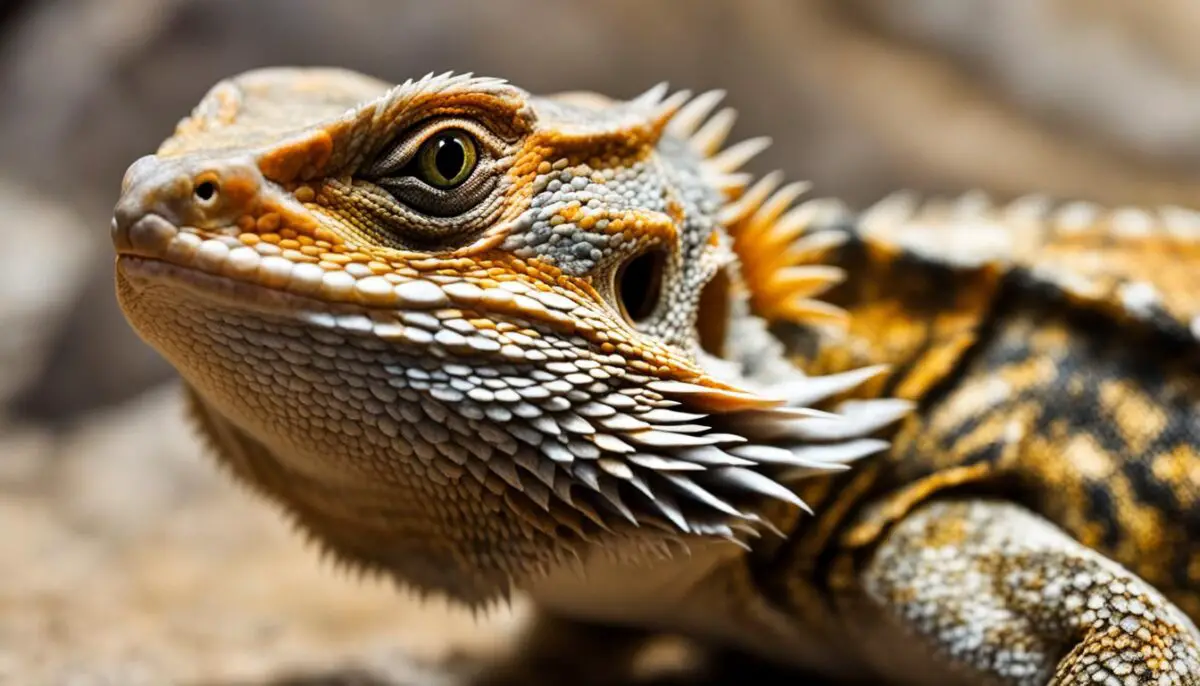
These stress marks can be caused by a variety of factors, including:
- Shedding: The process of shedding their skin can be stressful for bearded dragons.
- Adjustment to a new home: Moving to a new environment can cause stress for bearded dragons as they acclimate to their new surroundings.
- Growth and adaptation: Baby bearded dragons may develop stress marks as they grow and adapt to their new environment.
Recognizing these signs and stress marks is crucial for understanding the well-being of your bearded dragon. By identifying and addressing the underlying causes of stress, you can take the necessary steps to alleviate their discomfort and promote a healthier and happier life for your pet.
If you suspect that your bearded dragon is stressed, it is important to consult with a reptile veterinarian for a proper diagnosis and guidance on how to reduce stress and improve your dragon’s well-being.
Causes of Bearded Dragon Stress
Bearded dragons can experience stress due to various factors that affect their well-being. Understanding these causes is crucial for providing a healthy and happy environment for your pet.
Tank Issues and Stress
One common cause of stress in bearded dragons is related to tank issues. Incorrect temperature levels, inadequate lighting, and insufficient basking spots can create an uncomfortable and stressful habitat. Additionally, introducing new decor or live feeders without proper acclimation can disrupt the dragon’s sense of security and trigger stress.
Environmental Factors
Environmental changes outside the tank can also contribute to stress in bearded dragons. Moving to a new area or exposing them to loud noises, unfamiliar smells, or new pets can disrupt their routines and cause anxiety. Bearded dragons are creatures of habit, and sudden changes in their surroundings can be overwhelming.
Diet Changes and Stress
Another significant factor that can induce stress in bearded dragons is diet changes. Abruptly altering their diet or providing inadequate nutrition can lead to digestive issues and discomfort. Whether transitioning to a different diet or facing a lack of essential nutrients, these dietary changes can negatively impact your dragon’s well-being and contribute to stress.
To minimize stress in your bearded dragon, it is important to address these causes. Ensure that the tank environment is suitable, with proper temperature, lighting, and basking spots. Gradually introduce new decor or live feeders to prevent sudden disruptions. Keep their surroundings calm and minimize exposure to loud noises or new pets. Lastly, provide a balanced diet that meets their nutritional needs and avoid abrupt dietary changes.
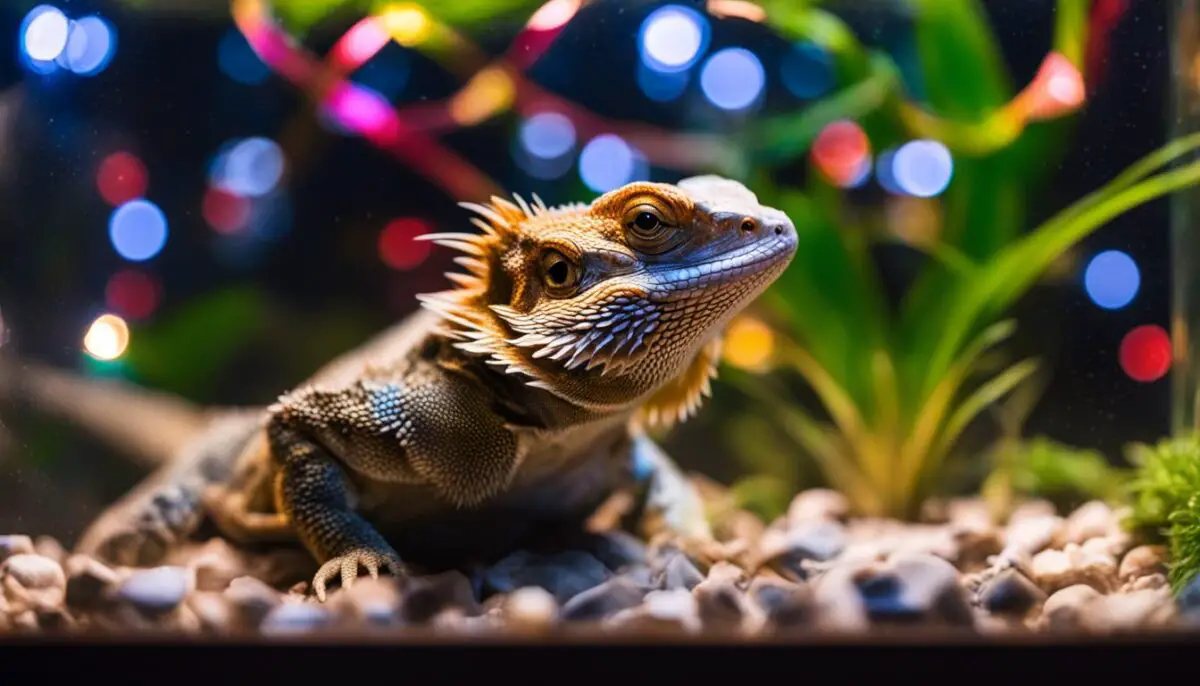
- Tank issues, such as incorrect temperature and lighting
- Introducing new decor or live feeders without acclimation
- Environmental changes, like moving or exposure to loud noises
- Diet changes, lack of nutrition, or abrupt dietary transitions
How to Prevent or Mitigate Stress in Bearded Dragons
To ensure the well-being of your bearded dragon, it’s crucial to create a happy and secure home environment that minimizes stress. By following these bearded dragon care tips, you can help prevent and reduce stress in your scaly friend:
- Avoid excessive handling: While it’s important to interact with your bearded dragon, too much handling can cause stress. Gradually introduce handling and allow your dragon to get accustomed to being touched.
- Provide proper temperature, lighting, and basking spots: Bearded dragons rely on specific temperature and lighting conditions to thrive. Ensure their habitat has the appropriate heat gradient and UVB lighting, as well as comfortable basking spots for them to regulate their body temperature.
- Maintain cleanliness in the terrarium: A clean habitat promotes a healthy and stress-free environment for your dragon. Regularly clean the enclosure, remove any waste, and provide fresh water.
- Minimize noise and speak gently: Loud noises and sudden movements can startle and stress out bearded dragons. Keep the environment calm and speak softly to create a soothing atmosphere.
- Engage in regular walks, playtime, and cuddle time: Just like any pet, bearded dragons benefit from enrichment activities. Taking your dragon for supervised walks, allowing them to explore outside their enclosure, and engaging in gentle play and cuddle sessions can help alleviate stress.
- Offer a balanced diet with proper nutrition: A nutritious diet is essential for your bearded dragon’s overall health and well-being. Provide a varied diet of vegetables, fruits, and protein sources appropriate for their age and size. Consider consulting a reptile veterinarian for specific dietary recommendations.
By implementing these preventative measures and providing a nurturing environment, you can significantly reduce stress in your bearded dragon, ensuring a happier and healthier life for your scaly companion.
| Tip | Benefits |
|---|---|
| Avoid excessive handling | Allows the bearded dragon to acclimate to handling in a stress-free manner. |
| Provide proper temperature, lighting, and basking spots | Helps maintain the bearded dragon’s physiological needs, reducing stress. |
| Maintain cleanliness in the terrarium | Creates a hygienic environment, minimizing potential sources of stress. |
| Minimize noise and speak gently | Reduces anxiety and promotes a calming atmosphere. |
| Engage in regular walks, playtime, and cuddle time | Provides mental and physical stimulation, reducing stress and promoting bonding. |
| Offer a balanced diet with proper nutrition | Supports overall health and immune function, preventing nutritional stress. |
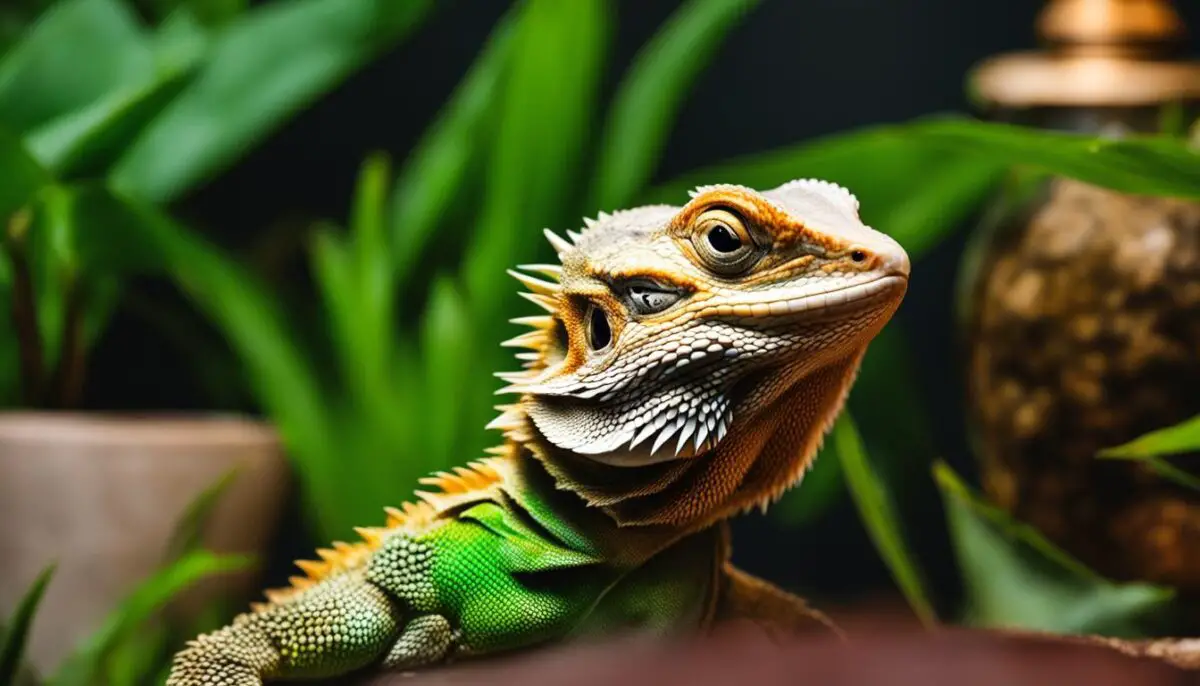
Expert Tip
“Creating a stress-free environment for your bearded dragon is essential for their overall well-being. By implementing a few simple bearded dragon care tips, you can help prevent stress and provide a happy home for your scaly companion.” – Dr. Emily Collins, Reptile Veterinarian
How to Calm a Stressed Bearded Dragon
If a bearded dragon is already stressed, there are several techniques that can help calm them. These include:
- Cuddling with the dragon: Spending quality time with your bearded dragon, gently stroking them or holding them close, can provide a sense of security and comfort.
- Wrapping them in a warm blanket: Mimicking the feeling of being held in a burrow or the warmth of the sun, wrapping your bearded dragon in a soft, warm blanket can help them relax and feel safe.
- Providing a warm bath followed by cuddles in a soft towel: A warm bath can have a soothing effect on your bearded dragon, and wrapping them in a soft towel afterwards helps maintain their body temperature and promotes relaxation.
- Reducing noise and light in the environment: Creating a calm and quiet atmosphere by minimizing external stimuli such as loud noises and bright lights can help your bearded dragon feel more at ease.
- Gently lowering a hand into the tank to offer familiarity: Slowly introducing your hand into the tank and allowing your bearded dragon to approach and investigate can build trust and reduce anxiety.
- Offering treats such as their favorite fruit: Providing treats that your bearded dragon enjoys, such as small pieces of their favorite fruit, can serve as positive reinforcement and help them associate positive experiences with their environment.
These calming techniques can help alleviate stress and provide comfort to your bearded dragon, fostering a sense of security and well-being.
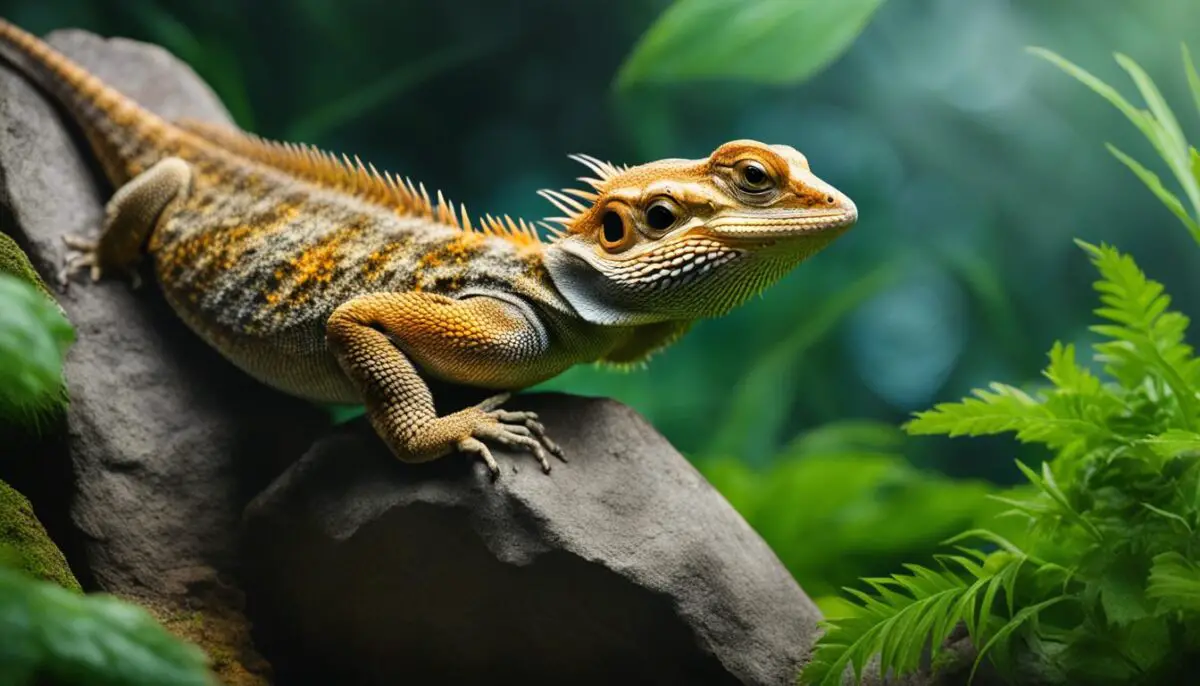
| Tips for Calming a Stressed Bearded Dragon |
|---|
| Cuddle with your bearded dragon to provide a sense of security. |
| Wrap them in a warm blanket for comfort. |
| Give them a warm bath followed by cuddling in a soft towel. |
| Reduce noise and light in the environment to create a calm atmosphere. |
| Gently offer familiarity by slowly introducing your hand into the tank. |
| Offer treats such as their favorite fruit as positive reinforcement. |
When to Call a Vet About a Stressed Bearded Dragon
While stress is a common experience for bearded dragons, there are certain situations where it is important to seek veterinary care. It’s essential to monitor your bearded dragon’s well-being and look out for signs that indicate the need for professional assistance. If any of the following conditions apply to your bearded dragon, it is recommended to call a vet for expert guidance and care:
- Stress marks that persist after shedding or for an extended period, indicating prolonged stress.
- Signs of illness such as difficulty walking, unusual body posture, or red and inflamed gums.
- A sudden and noticeable change in behavior, appetite, or energy levels.
- Unexplained weight loss, bloating, or any other abnormal physical symptoms.
- Injury or accident, such as an altercation with another pet or a fall from a height.
Bearded dragons are resilient creatures, but it’s important to be proactive when it comes to their health. If you observe any of these signs in your bearded dragon, it’s best to consult with a veterinarian who has experience in reptile care. They will be able to provide a thorough examination, proper diagnosis, and appropriate treatment for your stressed bearded dragon. Remember, early intervention can make a significant difference in your pet’s well-being.
Expert Insight: When to Call a Vet About a Stressed Bearded Dragon
“It’s crucial for owners to distinguish between normal stress behaviors and signs of serious health problems. Stress marks and occasional changes in appetite or behavior are often temporary and can be managed with proper care. However, if your bearded dragon’s condition worsens or if you notice persistent abnormalities, it’s important to involve a veterinarian. They can provide appropriate diagnostics, assess the overall health of your pet, and recommend the best course of treatment.”
Conclusion
Proper care for a bearded dragon’s belly health is crucial for their overall well-being. By understanding the signs of a stressed bearded dragon and taking proactive measures to prevent and mitigate stress, you can ensure a healthy belly and a happy reptile. It is essential to provide a secure and stimulating environment, maintain a balanced diet with proper nutrition, and seek regular veterinary care.
Stress can manifest in various ways, including loss of appetite, lethargy, and stress marks on the chin, neck, and belly. By addressing the underlying causes of stress, such as tank issues, environmental factors, or diet changes, you can significantly improve your bearded dragon’s belly health. Moreover, creating a calm and enriching atmosphere, avoiding excessive handling, and offering a balanced diet can further contribute to their well-being.
Remember, the belly health of your bearded dragon is an essential aspect of their overall health. Regular veterinary checkups, diligent care, and attention to their specific needs are integral to ensuring their long-term health and happiness. By taking these measures, you can enjoy a vibrant and thriving bearded dragon companion for years to come.
FAQ
What are the signs of a stressed bearded dragon?
The signs of a stressed bearded dragon can include loss of appetite, lethargy, stress marks on the chin, neck, and belly, hissing, head bobbing, and glass surfing.
What are the causes of stress in bearded dragons?
Bearded dragons can experience stress due to shedding, tank issues, environmental factors, poor diet, and mating season.
How can I prevent or mitigate stress in my bearded dragon?
To prevent or mitigate stress in bearded dragons, it is important to avoid excessive handling, ensure correct temperature and lighting in the habitat, maintain a clean environment, and provide a balanced diet with proper nutrition.
How can I calm a stressed bearded dragon?
Techniques to calm a stressed bearded dragon can include cuddling with them, wrapping them in a warm blanket, providing a warm bath followed by cuddles in a soft towel, reducing noise and light in the environment, and offering treats such as their favorite fruit.
When should I call a vet about my stressed bearded dragon?
It is important to seek veterinary care for a stressed bearded dragon if stress marks persist after shedding or for an extended period, if they show signs of illness or injury, and if diet and external factors are not the apparent cause of stress.
How does a bearded dragon’s diet affect their belly health?
A bearded dragon’s diet plays a crucial role in their overall health, including the condition of their belly. Providing a balanced diet with proper nutrition is essential for maintaining a healthy bearded dragon belly.

